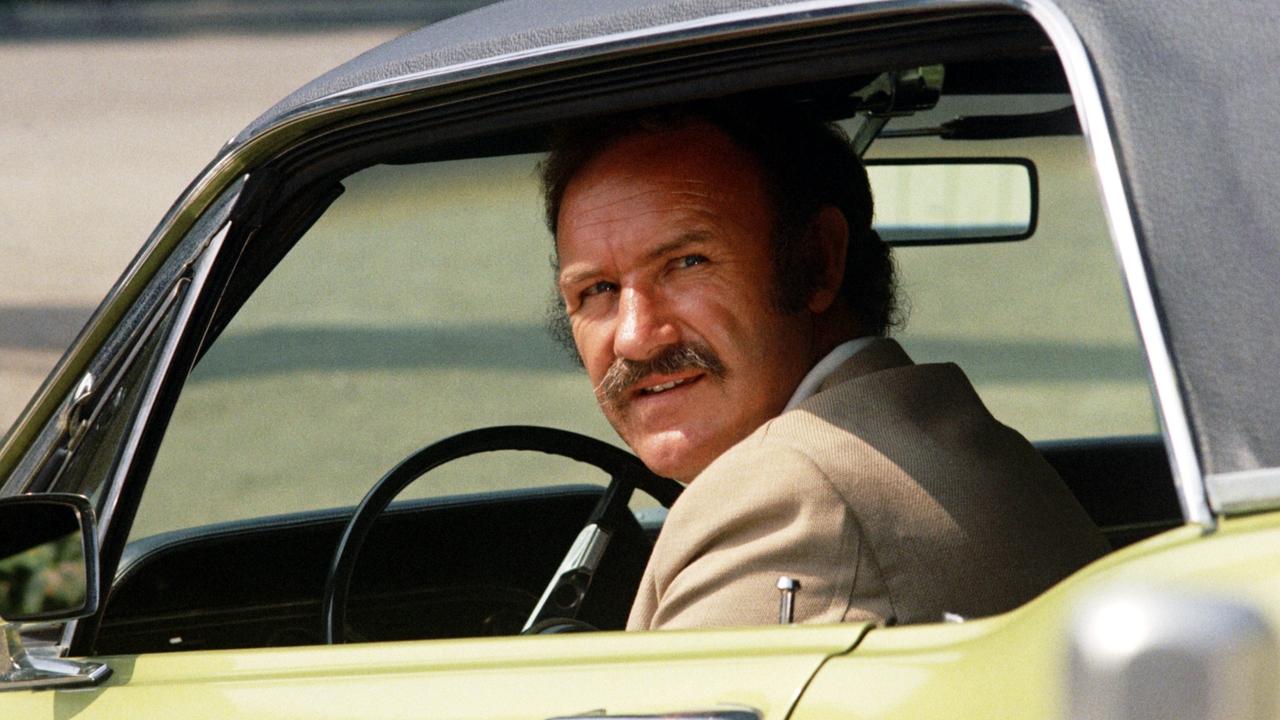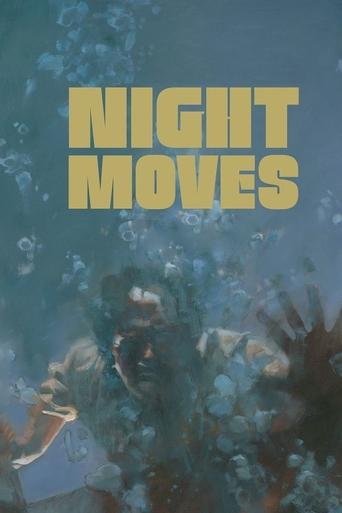

As the story unfolded, I assumed I was watching the filmization of a Ross Macdonald novel. All the characteristics and typical Ross Macdonald touches were there - from the snappy dialogue (when asked to My Night With Maud, the hero replies that seeing a Rohmer film is like watching paint dry; when asked to share the tub with a Hollywood hot-light, the hero replies that he'll keep it in mind for when he's feeling really dirty; when the hero asks Paula, as a plane lands outside the cabin, "Is that Tom now?", she comes back, "It isn't Lindberg!") to the technique of using a multi-stranded, multi-plotted detective story to pull away seamy layer after seamy layer of Los Angeles "society". It's a world in which nobody is as friendly as they seem on the surface, where the thickly-veiled threat is often followed through by naked action. And as too in Ross Macdonald, the plot is damned difficult to follow, part of the reason for this being that it is not regarded as all that important, merely a means to sociological and anthropological ends. I've seen the film twice now and I still can't follow it and it still doesn't make sense. However to judge it on the shortcomings of the plot, is to do the film a grave disservice. It's the characters and the atmosphere that count, Night Moves assembles some great characters, very cleverly and skillfully played and creates a powerful atmosphere abetted by the sharp location shooting by Bruce Surtees, the music score, and the film industry background that runs underneath it all. Yes, Night Moves is a film to see yet a third time!OTHER VIEWS: A confused and confusing plot, realistically acted, but - aside from one or two moments - directed in a disappointingly ordinary fashion. I expected a lot more drama from Arthur Penn. True, there's a bit of exciting action, but it's smothered under reams of dull talk. The photography is deliberately low-key.
... View MoreCited by many critics as one of the best and most important American movies of the 1970s, Arthur Penn's Night Moves hasn't stood the test of time in terms of popularity. The legacy of the nouvelle vague in France had inspired a whole generation of American film-makers to try new things, and to subvert genres as much as the studios would allow them. This led to a re-emergence of the film noir, a genre stuck very much in the 1940s and 50s. With its chain-smoking, loose- skinned leading men and devilish, glamorous ladies, its tough demeanour is very much a product of the time. A couple of decades later, and filmmakers such as Roman Polanski, with Chinatown, and Robert Altman, with The Long Goodbye, found new ways to explore this dark world and its shady characters, and are widely remembered for it. But no film has been as successful at cutting to the heart of what drives these self- loathing deadbeats and the manipulating bombshells distracting them as Arthur Penn's Night Moves.Private investigator and former American football star Harry Moseby (Gene Hackman) works freelance, preferring to gulp down coffees during long stakeouts on his own time than to be on the payroll of a larger agency. His wife Ellen (Susan Clark) tries to shake him out of his stubborn ways, but he's just an old-fashioned sort of guy. This lone wolf approach is in his blood, as after he turns down Ellen's invitation to the cinema, he monitors the situation anyway, discovering that his wife is having an affair in the process. Meanwhile, former actress Arlene Iverson (Janet Ward) hires Harry to track down her missing, promiscuous daughter Delly (Melanie Griffith). A conversation with mechanic Quentin (James Woods) leads Harry to a thrill-seeking movie stuntman, and then to the Florida Keys, where he discovers Delly hiding out with her stepfather Tom Iverson (John Crawford), and a striking woman named Paula (Jennifer Warren).As a straight-forward detective story, Night Moves will likely divide an audience. With its unhurried approach and eagerness to explore Harry's troubled home-life and self-destructive behaviour, the jarring tones may not suit everybody's tastes. Night Moves is much more about the character than the case he is on. The movie mainly succeeds in this balancing act because of the performance of Gene Hackman, an actor working at the very top of his game. In the 70s, he was part of a group of actors who rebelled against Hollywood gloss, and portrayed real people in real situations. Harry is ultimately a good-hearted guy, tragically failing to see the irony when he demonstrates his knowledge of 'check mate' moves in chess to Paula, with sight of own possible fate in the unravelling mystery. As the plot moves on and Harry finds himself caught up in far more than he had bargained for, the revelations become increasingly confusing. But I didn't care: It's the kind of convolution warmly embraced by the Coen Brothers in neo-noir The Big Lebowski. It isn't a masterpiece, but Night Moves deserves to be remembered as one of the most important American movies of its decade.
... View MoreFirst class stinker way below the talents of Gene Hackman and the rest of the cast.The plot is not to be believed. How could any mother, even a drunken one, react to the death of her 16 year old daughter like that? Calling the deceased a bitch was way over-the-top. Seems as though nearly everyone in the film was either involved in the murder or caught up by the original murder which led to the death of the 16 year old.As the guy who fixes more than cars, James Woods turned in a decent performance. Susan Clark plays the detective's (Gene Hackman) wife who is neglected and falls into the arms of another man.The ending scene where practically gets it is totally unrealistic.
... View MoreHarry Moseby (Gene Hackman), LA private investigator and former NFL player, has a marital problem. He likes his loner private eye lifestyle, but his wife Ellen (Susan Clark) wants Harry to join a large detective agency. Ellen, an antiques vendor, commits adultery and even has the effrontery to take offense. But as he is able to locate people, Harry can divert from his marital problems.Harry's front man Nick (Kenneth Mars), who collects old Mexican statuary, leads him to frumpy alcoholic Arlene Iverson (Janet Ward), a most promiscuous and aging B-grade movie actress, to retrieve her 16-year old runaway stepdaughter Delilah "Delly" Grastner (an uninhibited 16 or 17-year old Melanie Griffith during filming). Arlene's deceased first husband was a movie mogul, the reason for her getting a few acting roles. Divorced from her second, Tom Iverson, Arlene relies on Delly for her only means of support through a trust-fund, although step-mom needs to maintain custody. Arlene tells Harry that Delly uses drugs and has a licentious lifestyle (like step-mom). Acting on a tip from mechanic Quentin (James Woods) one of Delly's former boyfriends whom Harry tracked down, Harry heads to a filming location, where he meets stunt pilots Joey Ziegler (Edward Binns) and Marv Ellman (Anthony Costello); the latter and Quentin fought over Delly. After, during Harry's second meeting with Arlene, he learns that he can find Delly in the Florida Keys living with her stepfather Tom Iverson (John Crawford) a charter pilot. In Florida Harry finds Delly, who is staying with Iverson and Paula (Jennifer Warren). Harry soon becomes aware that Tom is involved with smuggling of some kind. Tom tells Harry that he wants Delly to return to her stepmother. We later learn that Tom "got foolish" with Delly. "There oughta be a law," he says to the investigator. Harry retorts, "There is." SPOILERS BEGIN: Meanwhile we are immersed in a convoluted plot, not always well explained, about smuggling $500,000 worth of Yucatan art treasures and murder. One night during a boating trip in Iverson's boat ("Point of View"), skinny-dipping Delly locates a crashed airplane with a dead pilot inside, his face eaten away by fish. (We later learn that it is Marv; observe he is no longer seen on the film.) Paula lies to Harry that she placed a float to mark the spot for the Coast Guard. In reality she wants to help Tom locate and move the sunken smuggled artifacts. Paula lies often. Now Harry loves chess. He tells Paula about a 1922 game (Germany) where Black had a checkmate over White with a Queen sacrifice and three follow up moves with Knights: "He played something else and he lost. He must have regretted it every day of his life. I know I would have." Will Harry be like him and not see the correct moves until it is too late? The movie title can metaphorically morph to "Knight Moves." Anyway at night Paula makes a move on Harry, but it is really a diversion for Tom to get away and move the downed artifacts. During the same night skittish Delly has a nightmare, after which she demands to be taken home.Back in LA Delly argues with Arlene, and Harry's wife Ellen still has her lover. Then Ellen hears that Delly died while filming an on-location stunt with Joey Ziegler. Was she put away purposely? Probably she naively blabbed her discovery to the wrong folks. Anyway, Ziegler himself was injured and has his right arm in a full, extended cast. Did Quentin tamper with the prop car or even Marv's crashed airplane? He denies everything, but tells Harry that Marv was the dead pilot. In any case Arlene does not morn the deceased Delly. Later Harry seems to reconcile with Ellen.Back in Florida, Harry finds Quentin's body floating in the water off Iverson's dock. A man is seen nearby in a powerboat moving quickly. Harry, noting that Tom killed Quentin, pulls a handgun on Tom and Paula. There is a subsequent fist-fight, after which Tom's head strikes hard against a post (cold-cocked or dead). From Paula Harry gathers that Marv, Tom, Quentin, and Paula were involved in smuggling statues from the Yucatan. Marv's job was to fly them into the US and deliver them to Tom and Paula in Florida. Tom and Paula brought them to another who sold them to Nick. Perhaps Nick (who supposedly – but falsely – does not know Ziegler) got the original assignment to Harry to return Delly home before she could somehow interfere with the operation.On Tom's boat Harry and Paula put out to sea to find the submerged airplane and sunken artifacts. At the site, while Paula dives below, a seaplane intercepts them and the pilot fires a submachine gun, wounding Harry. As the airplane lands on the water Paula is struck and killed. But as the pilot also struck a hard statue, the airplane crashes with him going underwater. Drowning, Ziegler (Joey, whom Harry trusted!) seems to apologize to Harry. The entire operation was apparently Ziegler's. With the body count rising and with things getting too dangerous, Ziegler was probably trying to unload Tom (and Paula). Harry is alone as the boat curls around in circles. He never understood the events that swirled around him until it was too late. As he previously told Paula, "I didn't solve anything. This just fell in on top of me." Poor Harry! The movie is one of the better ones of the early 1970s, when happy endings were not always the norm. For instance, "Five Easy Pieces," "Deliverance," "The Gambler," "Don't Look Now," and "The Parallax View" all come to mind. "Night Moves" is so constructed around Gene Hackman that he appears in every scene and does very well. The actor is able to get our sympathy and support, even though he is not a Bogart-type of detective. This film probably requires multiple viewings to aid in one's comprehension.
... View More